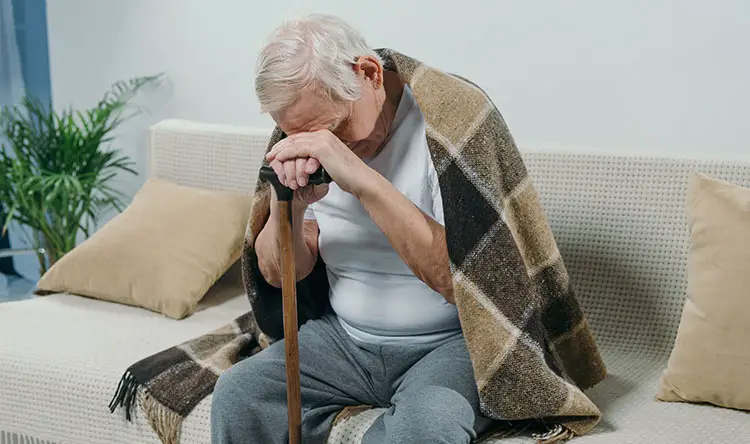There are times when you may be seeing signs your family doesn’t care about you. The time spent together is not the same as it used to be. Your family may be forgetting your birthday, anniversary, or visiting you is becoming less common than before. As you age, you may feel that you are not appreciated and that your opinion is given little value. If you feel that your family undervalues you or does not acknowledge your needs, read on and let’s see what you can do.
Signs Your Family Does Not Care
You should understand what a family that does not appreciate you, abuses, or neglects you looks like. The following six signs may indicate that you have a toxic family, and that you may need professional help to understand what is going on and how to deal with it.
1 – Your Family Abuses You
Family abuse, especially among the elderly, is very common. The most frequent domestic abuse scenario involves an aggressor (usually an adolescent or mature male) and the victim (child or an older member of the household). The most common abuse methods include:
- Stealing your money (especially retirement, social insurance money, savings, etc.).
- Frequent lies about emergency home and car repairs and maintenance costs that other family members cannot afford.
- Physical abuse: locking you in, limiting your freedom in outside spaces, not letting you shop, occasional hit or slap, taking you to places you would rather not go, etc.
- Emotional abuse: calling you names, disregarding your needs (including physical needs, such as hygiene, food, medication, and exercise), belittling you (especially in social or family events).
Sadly, it is family members who are most likely to financially abuse seniors.
2 – Your Family Ignores Boundaries
Another sign your family doesn’t care about you includes not respecting your boundaries. We all have the right to our own space and free time and often find ourselves not being given that kind of privacy. Frequently entering your room when you should be left alone and not respecting your mealtime and bedtime are some signs of ignoring healthy family boundaries. Furthermore, not paying attention to your emotional boundaries and overstepping what is considered polite is another sign your family may be toxic for you.
3 – Your Family Doesn’t Care About Your Feelings
A dysfunctional family member will often disregard your feelings or gaslight you when you voice your feelings. This disregard can come from your family never calling to check on you; focusing only on their problems; not being there for you, especially during sickness or mourning; and being reluctant to speak about your needs and concerns.
In comparison, an emotionally healthy family:
- Supports each other;
- Takes care of the elders;
- Is there to listen and support;
- Respects differences in age, worldviews, experiences, and opinions; and
- Takes care of both your physical and emotional health.
4 – Your Family Doesn’t Care About Your Mental Health
Your mental health is often at risk if your family is dysfunctional or abuses you. If you feel that your family doesn’t care about you, you may experience boredom, sadness, anxiety, or even depression. A good family will be there for you to help you through difficult times and to guide you as you heal. A family that does not care will neglect your issues and not be there to support you in times of need.
5 – Your Family Doesn’t Listen to You
Another common sign your family doesn’t care about you is if there is no place for your opinion. As an elderly family member, you may have more knowledge and experience in some aspects of family life, such as cooking, cleaning, and taking care of the house and the garden. If your family disrespects your opinion and advice, you may have a family that does not care about you.
6 – Your Family Does Not Support You
You should have plans, aims, and aspirations at any age or season in life. If your need to fulfill these dreams is neglected, you are told to stay away from your hopes, stop trying, your social life is limited, or you are not allowed to see your friends, you may be a part of a toxic, neglectful family. A healthy family will always support you for as long as the activities you pursue are safe for you and will offer a helping hand when you need it.
How to Know if Your Family is Toxic for You
Many people live in toxic families without even realizing it. The difficulty lies in recognizing what a toxic family looks like, as opposed to a healthy family. Since not many of us have had an upbringing characteristic of a completely healthy, non-toxic family environment, recognizing toxicity can be difficult. However, there are some common toxic family traits:
- Your feelings, needs, and rights are not respected;
- Family members act harsh and speak in a disrespectful tone;
- Your boundaries are not respected, your private space is compromised, and you are not given a safe space to seclude;
- You are never right;
- Your rules are not respected – theirs must be;
- There is no compromise even over minute daily activities (such as making a meal, taking a break, or even doing the laundry);
- Calling you names and belittling you; and
- Leaving you out of family events.
How to Deal with Being Left Out of Family Events
Being left out of family events can be a hard blow to anyone. This is especially true if these events are the highlight of your year. If you find yourself being left from family gatherings, there are a few things you can do:
- Speak with your family – they must hear your needs.
- Examine your family’s status – common family problems, such as loss of a job or a divorce, may have resulted in no family events for a while.
- Call and stay in touch, even when your family may be busy to call you back.
- Do not assume that you are the problem – problems never reside in a person. They are a form of miscommunication.
Family Doesn’t Have to Be Blood
Understand that family doesn’t have to be blood. You may feel pressed to give in to the feelings of loneliness or sadness, but you should not. There were periods when you were younger when you felt that you needed time alone. If your family wants that time now, give it to them, and focus on yourself, your hobbies, and your friends. Your friends will often understand you better than your family ever will due to common ages and similar upbringings. However, prolonged periods of no contact with your family may be indicative of deeper problems.
What if You Cannot See Grandchildren?
Unfortunately, grandparents in the USA face an uphill battle if they want access to their grandchildren. US laws focus primarily on the parents’ right to choose what is best for their child, but there are options.
According to NOLO:
All 50 states and D.C. currently have some type of “grandparent visitation” statute through which grandparents—and sometimes others (foster parents and stepparents, for example)—can ask a court to grant them the legal right to maintain their relationships with beloved children. But state laws vary greatly when it comes to the crucial details, such as who can visit and under what circumstances.
https://www.considerable.com/life/family/grandparent-rights-united-states/
However, the Supreme Court has affirmed parental decision making in at least one case, ruling that lower courts must presume that it’s in a child’s best interest when a parent refuses a grandparent’s request for visitation. The burden to prove otherwise lies with the grandparent. (Troxel v. Granville, 530 U.S. 57.)
Laws vary from state to state, so look at what grandparent rights are in your state, and consider hiring an attorney if necessary. If you cannot afford a lawyer, it’s possible that you may qualify for help from your state’s Legal Services for the Elderly help. See our listing of state services to find legal help in your area.
How to Find a Way to Clear the Air
If you find yourself burdened with family issues and finding no easy way out, it may be time to sit down and think about how to clear the air in a dysfunctional family. Every family is different, so solving problems in a single-parent family is not the same as solving problems in a family burdened with domestic abuse. Here is how you can remedy some family issues:
- Firstly, understand your emotional and physical state – can you offer some help? Single moms and single dads often need someone to help with children while they are at work, and busy couples trying to establish a career need some help around the house.
- Secondly, understand their emotional needs – do they need someone to talk to? Do they need some advice? How do they react to criticism? Understanding all of these is a key to good communication.
- Thirdly, understand the circumstances – sometimes, you may be left out of a family vacation because the family needs some alone time. Elderly family members often do not enjoy some activities, such as visits to entertainment parks or hours spent shopping.
What if Nothing Can Be Done
If you find nothing can be done to fix family issues and communication, you may want to reconsider your stance. Sometimes, issues are best left untouched, as digging too much risks injuring you more and making you feel insecure. Whenever a family problem arises that you cannot work out, consider the following:
- Is the problem worth fighting over?
- Is temporary separation, even for a few days, going to solve the issue?
- Can you do something to act more calmly when the problem is brought to the table again?
- Can you show more respect for their opinion and try to understand their take? The generation gap is a real thing, after all.
- Can you stick to the topic, avoid changing topics, and bringing in old problems?
If nothing else works, you can always rely on yourself. You can also seek comfort among friends, ask for advice or ask that they join you in their free time. Finally, seeking professional help may help you deal with these issues much more maturely than any friend could.
Summary
Abusive, neglectful, and toxic families are a part of life. However, if your family does not care about you it can lead to emotional damage, trauma, and insecurity. Learn how to recognize what a toxic family looks like, learn how to deal with it, and minimize the damage they can inflict. Staying on top of the issues and remaining cool-headed is the best thing to do in the face of family issues. Follow our tips and secure your emotional and mental health.
Do you have experience with family members who do not care about you? What are your struggles? Were you able to resolve them? Let us know in the comments section.


